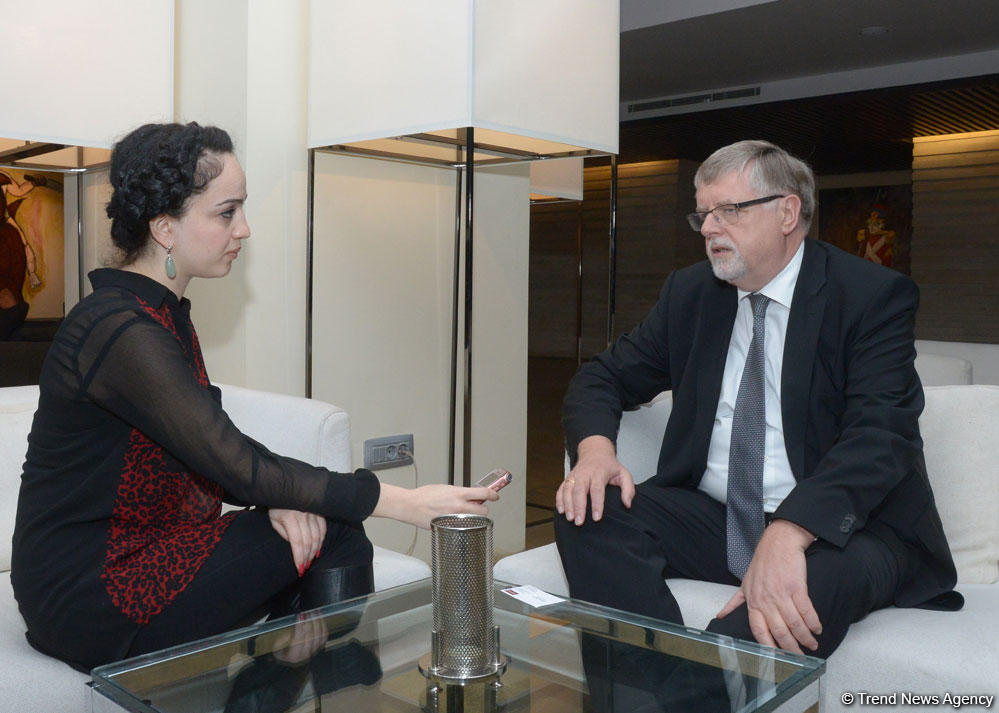Baku, Azerbaijan, Apr. 15
By Anakhanum Khidayatova - Trend:
Status quo in the Armenia-Azerbaijan Nagorno-Karabakh conflict is not sustainable, says Herbert Salber, the European Union's special representative for the South Caucasus.
He made the statement in an exclusive interview with Trend in Baku, Azerbaijan, on Apr. 15.
Salber said he has had meetings with the Azerbaijani president, foreign minister and defence minister, and they discussed the recent escalation along the line of contact between the Azerbaijani and Armenian troops.
"We discussed the escalation that took place at the line of contact at the beginning of April, the aftermath of these developments, and of course the prospects of how this issue can be solved," he said.
"The EU clearly has been saying for quite some time that status quo is not sustainable and a political solution has to be reached," Salber noted. "Now, we have been raising this with both sides and all indicators tell us that the status quo is not sustainable, a solution must be found."
He went on to say the EU respects the leading role of the OSCE Minsk Group and its co-chairs, adding that this role has to continue.
"The Minsk Group has been helpful and we, the EU, very much encourage the Minsk Group to continue with these endeavours," he added.
Salber, further touching upon Russia's proposal on the Nagorno-Karabakh conflict's settlement, said, "we don't know what is the certain proposal."
"If I see it correctly, the Minsk Group co-chairs support the proposal," he said. "We think it is good if the Minsk Group is standing behind [the proposal]."
Earlier, during a meeting with Azerbaijan's President Ilham Aliyev, the Russian Foreign Minister Sergei Lavrov said "We have the proposals that we are trying with the co-chairs to actively use for achieving an agreement between Azerbaijan and Armenia."
On the night of April 2, 2016, all the frontier positions of Azerbaijan were subjected to heavy fire from the Armenian side, which used large-caliber weapons, mortars and grenade launchers. The armed clashes resulted in deaths and injuries among the Azerbaijani population. Azerbaijan responded with a counter-attack, which led to liberation of several strategic heights and settlements.
Military operations were stopped on the line of contact between Azerbaijani and Armenian armies on Apr. 5 at 12:00 (UTC/GMT + 4 hours) with the consent of the sides, Azerbaijan's Defense Ministry earlier said. Ignoring the agreement, the Armenian side again started violating the ceasefire.
The conflict between the two South Caucasus countries began in 1988 when Armenia made territorial claims against Azerbaijan. As a result of the ensuing war, in 1992 Armenian armed forces occupied 20 percent of Azerbaijan, including the Nagorno-Karabakh region and seven surrounding districts. The 1994 ceasefire agreement was followed by peace negotiations. Armenia has not yet implemented four UN Security Council resolutions on withdrawal of its armed forces from the Nagorno-Karabakh and the surrounding districts.
Further during the interview with Trend, Salber said the Minsk Group is the right form to push negotiations on the Nagorno-Karabakh conflict.
"I don't believe that the format of the Minsk Group should be changed," he said, adding that the change of format would require a new consensus with the OSCE.
"I doubt this consensus could be achieved," he stressed.
Salber further pointed to the necessity for the parties to respect the ceasefire and show the strength not to go to any risks.
"Parties should know it is an obligation for them to act in a responsible way," he added.
Speaking about his trip to Baku, Salber said the visit was exploratory to understand better where the endeavours for a peaceful solution are at the very moment, and how the sides see these endeavours.
Salber also said the visit was fruitful.
"It gave me some insights that I can report to the leadership of the EU," he added. "That helped me a lot."
He added that the EU member-states are interested to know what is happening in Azerbaijan.






